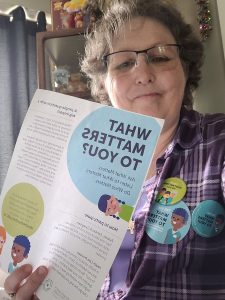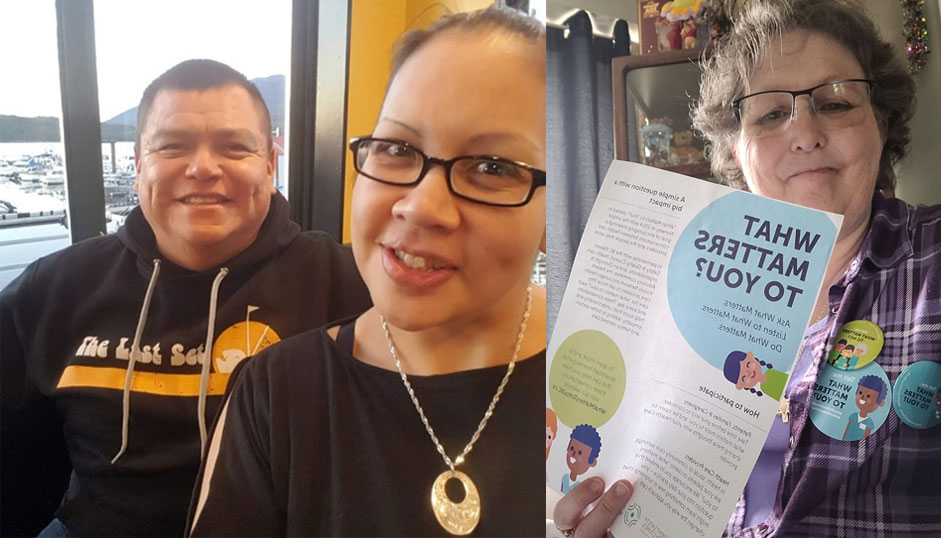Patient Partners Share What Matters to Them
International “What Matters to You?” Day is celebrated on June 9th, but it’s a concept and question that has the potential to humanize health care as well as improve care outcomes and patient experiences each and every day of the year.
We’re always keen to hear when and how the question is being asked and answered at the point of care. Thank you to the following Patient Voices Network patient partners who took time to share their experiences with us!
Cyndi Peal, Bella Bella

Herman White and Cyndi Peal
Tell us a bit about yourself and/or your care experiences.
My husband-to-be recently had a life-changing surgery. The surgeon, surgical team, nurses and staff were very accommodating and provided excellent care throughout the process and during his hospital stay. This made a huge difference in his experience and led to a very successful surgery and quick recovery. We come from a rural and remote Indigenous community and felt very welcome and well taken care of. After struggles that he experienced from early childhood through teen and youth years to adulthood, now with the help and wonders of modern medicine, he has an improved physical, mental and emotional healthy, active life. The challenges he faced throughout his life did not stop him from doing many great things and with this successful surgery he is now mostly pain free and has added ability, range of motion and strength.
Who asked you “What matters to you?”
First the surgeon and surgical team asked, then later nurses and student nurses. When the surgeon asked, “What matters to you?” I immediately said, “Thank you so much for asking!” Communication matters to me and being treated with kindness and respect. What matters to me is that the specialized surgeon and their support team take the time to see each patient and have meaningful conversations. I love that they are open to any and all questions.
When the nursing staff asked, “What matters to you?”, I replied, “Thank you for asking, it confirms the importance of the continuum of care! I feel comfort in knowing my hubby is in good hands and being well cared for. This lets us feel less stress and welcome.”
My hubby was very happy to hear these questions and had his own replies each and every time he was asked. His response to the surgeon was direct questions in regard to the surgery and how long he would be in surgery and in the hospital afterward. My hubby of course wanted to know how soon he could return to work. The surgeon was very positive and had explained the realistic possible affects of surgery and the possible positive timeline of recovery. It helped him feel safe and cared for.
How did being asked this question make you feel?
As a caregiver being asked this question, I immediately felt relief. It also broke the barrier of cultural differences in that we are Indigenous and the care team may be of different ethnic backgrounds.
What changed when you were asked “What matters to you?”
Being asked this question immediately lessened the stress of having questions and worries. It changed the way in which I felt towards the health care team in the hospital. It opened the communication in a very good way. It took away the awkwardness in the sterile environment and it brought in light and warmth.
What did you learn from this experience and what would you like others to know about the importance of being asked this question?
Not everyone is the same or in the same situation. Asking this one question can be key for many people, as it can be the beginning of connecting health care teams to their patients and families in a good direct way.
Michel White, Abbotsford
Michel takes ownership and control of the question and uses it herself as an icebreaker and opener in care interactions. Read more!

Michel White
Who asked you “What matters to you?”
Actually, it’s often me asking doctors, nurses or care providers, “What matters to you?” I tell them I am very interested in what matters to them and to me, so when they are finished telling me what matters to them, I then tell them what matters to me. I do this because I feel both are very important.
How did being asked this question make you feel?
I ask it all the time to anyone I feel will want to answer the question. I find that the majority of people that I ask it to are amazed that I am interested in what is important to them, whether it’s health care or their life. I tell them it’s all important and I am interested.
What changed when you were asked “What matters to you?”
The very first time I was asked “What matters to you?” I felt very vindicated. Someone was listening and actually cared about what matters to me. It had such an impact that I have been an advocate for “What Matters to You?” ever since.
What did you learn from this experience and what would you like others to know about the importance of being asked this question?
The importance is that someone cares enough to listen to you talk about “What matters to you?” It’s not that someone is being nosey, it’s that they care enough about you, and whether it’s health care, your health or something outside of work, to listen to your answers. Not everyone is willing to listen and it’s a great skill to have when asking “What matters to you?”
Creating the space and time for a “What Matters to You?” conversation is easy and involves three simple steps:
- Asking what matters.
- Listening to what matters.
- Doing what matters.
We welcome you to join our annual celebration of “What Matters to You?” Day on June 9. Use the #WMTY hashtag on social media to join the conversation and find more resources and information here.


